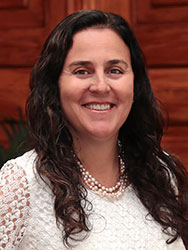Advancing research in Peru: Q and A with Dr Patricia Garcia
March / April 2018 | Volume 17, Number 2

Patricia Garcia, M.D., M.P.H., Ph.D.
Patricia Garcia, M.D., M.P.H., Ph.D. is a professor and former dean of the School of Public Health and Administration at the
Universidad Peruana Cayetano Heredia (UPCH) in Lima, Peru, a position she has held since 2011 with a 15-month interruption to serve as her country's minister of health. A former Fogarty trainee, Garcia was the first woman to lead the Peruvian National Institute of Health and has served on a number of high-level WHO advisory committees. Garcia earned her master's of public health from the University of Washington, and her M.D. and Ph.D. from UPCH.
How did Fogarty shape your career?
It was through Fogarty's
AIDS International Training and Research Program (AITRP) that I went to the University of Washington, where I was exposed to research and started my career as an infectious diseases doctor. As an AITRP trainee, I learned what makes an enabling environment for research, and when I returned to Peru, I was able to create one at Cayetano Heredia's School of Public Health. I believe that every single step you take in life shapes who you are, and the steps I've walked with the help of Fogarty were instrumental in helping me to achieve a great deal, including being appointed health minister and becoming the first doctor in my family.
Every step you take in life shapes who you are. And the steps I’ve walked with the help of Fogarty were instrumental in helping me to achieve a great deal, including being appointed health minister.
Dr. Patty Garcia
Professor, University of Cayetano Heredia
Former Minister of Health and Director of NIH in Peru
How did UPCH become a research powerhouse?
First of all, Fogarty gave many Peruvians the opportunity to train in the U.S. Second, we've been able to access numerous grants through Fogarty, including early career support that allows trainees to come back to Peru, and training grants that have allowed us to devise and implement our own programs. One Fogarty training grant allowed us to develop a program for medical informatics that is now used in Peru and more broadly in Latin America. Fogarty has also taught us to network more effectively by giving us the opportunity to interact with U.S. researchers.
How has Fogarty advanced research in Peru?
One of the things I'm proudest of is that I helped obtain funding from Fogarty for several Peruvians who, as faculty members at Cayetano, are doing the same for the next generation. It's like having my kids, grandkids and great-grandkids with me at Cayetano - generations who have benefited from Fogarty training and are now doing research.
Fogarty's investment in Peru has been catalytic. Former Fogarty trainees laid the foundations for preventing and controlling HIV and STDs in Peru. We've introduced point-of-care tests. Medical informatics in Peru started at Cayetano with grants from Fogarty. One of those grants allowed us to create a center for training and research in medical informatics for global health, which people from around Latin America have attended.
How do you foster collaboration at Cayetano?
We've learned that promoting collaboration from the very beginning of people's careers teaches them to work together. Let me explain that by using the example of our Fogarty-supported project called
Kuskaya - the word in
Quechua, the language of the Incas, for “working together.”
Kuskaya brings together people from different disciplines, at least one of whom must be from the global south and one from the north. We've had projects that pair architecture and health, media and health, physical activity and health, cellphones and TB. Through a
Kuskaya project run by a Fogarty trainee in the Amazon, called “Mothers of the River,” women with solar-powered tablets are reducing maternal mortality in jungle communities.
How do you share knowledge beyond Peru?
South-south cooperation is very important to us. People from Mexico, Bolivia, Venezuela, Colombia and Ecuador attend the Andean Center for Training on Medical Informatics. At the Latin American Association for STDs, which we created, we've been working with several countries on the introduction of rapid syphilis tests, among other issues.
We also do south-north cooperation - advising the U.S. on how to do things in developing countries. USAID recently contacted me to ask about our experiences in Peru with antiretroviral therapy. They're trying to change the system they use to provide antiretroviral therapy in Sudan.
And future generations of researchers and doctors from the U.S. come to Peru to train. Here in Peru, they encounter diseases they don't have in the U.S., so when they do see them back home, they know what to do. So we work with others as collaborative citizens of the world. That's what Fogarty trains us to be.
More Information
To view Adobe PDF files,
download current, free accessible plug-ins from Adobe's website.